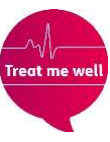
Reasonable adjustments can be simple changes made by one healthcare professional, or they can be more complex and need multiple teams to work together. Making reasonable adjustments can mean removing barriers that people with a learning disability face, or providing something extra for someone with a learning disability to enable them to access the healthcare they need.
Top 10 Treat Me Well reasonable adjustments
- Speak clearly and use simple words. understanding. It is really important not to make assumptions that someone has understood information they have been given
- Take your time. People with a learning disability may need a bit longer than other patients to be able to understand information they are given and to make themselves understood. Just ten extra minutes can make a big difference to many people
- Work with supporters. This could be a support worker or family member. Supporters can be really important, particularly for people with profound and multiple learning disability, but remember to talk to the person directly and support them to make decisions - supporters are there to help you do this!
- Be flexible with appointment times. Many people with a learning disability will find it easier coming to hospital when it is quieter, so an appointment at the very beginning or very end of the day might make their appointment go more smoothly. They may also need an appointment at a time when their supporter is able to accompany them
- Make sure people can get into and around the hospital. This includes ensuring there are no physical barriers for people using wheelchairs or with mobility issues, but also making sure signs in the hospital are as easy to understand as possible
- Provide a quiet place to wait. Hospitals are often busy, noisy places and this can be overwhelming for many people with a learning disability. Having a quiet place to wait can prevent people getting anxious and having to leave the hospital. Many people also find waiting a long time very difficult
- Listen to your learning disability liaison nurse. Most hospitals have learning disability liaison nurses who know lots about reasonable adjustments and can help you to support your patient. Ask your learning disability nurse if you know you will be seeing a patient with a learning disability
- Use hospital passports. These are a patient-held, personalised record of what people with a learning disability have hospital passports and reading them will make your job a lot easier!
- Provide written information in Easy Read format. This means people are much more likely to read and understand information about their appointments, procedures and results. This is also a requirement of the NHS's own Accessible Information Standard.
- Always ask the person what they need. Reasonable adjustments are about what the person in front of you needs and they know that better than anyone. and any family or carers with them and do your best to provide the support they need



